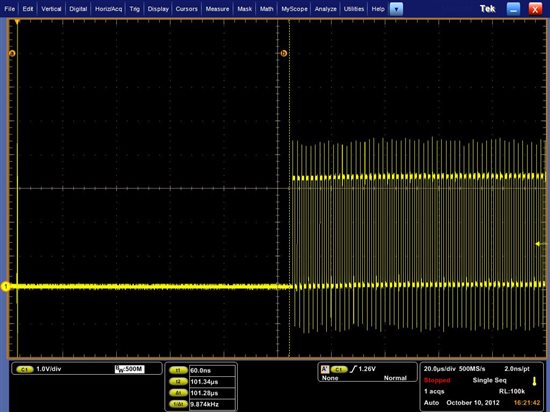Hi,
When working with timers in the MSP430FR5739 I can detect a certain delay (not constant and always in the range of µs) when switching on the signal and outputing the capture/compare unit output. I will expect having a delay of some nanoseconds but µs are a good bunch of cycles in between.
Does anyone know where does this delay come from? Is it possible to avoid it?
As an example for reproducibility I am using the next code:
#include <msp430fr5739.h>
;------------------------------------------------------------------------------
ORG 00FC00h ; Program Start
;------------------------------------------------------------------------------
RESET mov.w #01FFFh,SP ; Initialize stackpointer
StopWDT mov.w #WDTPW+WDTHOLD,&WDTCTL ; Stop WDT
mov.w #CSKEY, &CSCTL0
mov.w #DCOFSEL0+DCOFSEL1+DCORSEL, &CSCTL1 //DCO runing at 24MHz
mov.w #SELM__DCOCLK+SELA__DCOCLK+SELS__DCOCLK, &CSCTL2 //clocks running at 24MHz
mov.w #00h,&CSCTL3
bis.w #DIVA__2,&CSCTL3 //divide the auxiliary clock frequency by 2
bis.b #BIT0+BIT1, &P1DIR //output the timer signal in P1.1
bis.b #BIT0 + BIT1, &P1OUT
bis.b #BIT1,&P1SEL0 //secondary function selected in port direction
//timer setup for generating a 600KHz clock signal
bis.w #TAIDEX_4,&TA0EX0 //divide the frequency by 5, the auxiliary clock was already divided by 2 so we get f/10=1200KHz
mov.w #1,&TA0CCR0
mov.w #OUTMOD_4, &TA0CCTL2 //PWM output mode: 4 - toggle */
mov.w #1,&TA0CCR2
bis.w #TASSEL__ACLK+MC_3+TACLR,&TA0CTL // Timer A0 mode control: 3 - Up/Down */and Timer A source ACLK
FF: jmp FF
nop
;-------------------------------------------------------------------------------
COMMON INTVEC ; Interrupt Vectors
;-------------------------------------------------------------------------------
ORG RESET_VECTOR ; POR, ext. Reset
DW RESET
END
I attach the result that I get in the Osci when meassuring the output on the pin P1.1:

As shown in the Osci the delay between the port is switched to timer output mode (bis.b #BIT1,&P1SEL0 ) till we get the timer output is around 100µs. If we are working at
24MHz, these are 2400 cycles in between.
I would appreciate any help.
Thanks in advance.

